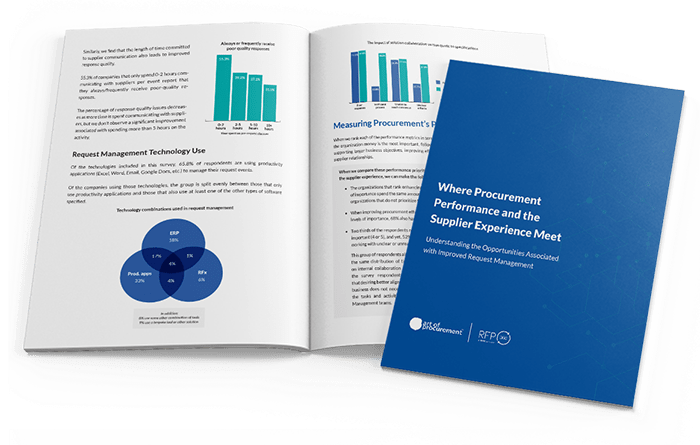Effective procurement should be a top priority for any business. From enterprise organizations with dozens of procurement professionals to businesses without a dedicated procurement role, getting it right is crucial. Luckily, procurement consulting teams can help.
Procurement consulting firms leverage experts to enable, empower and assist businesses with their needs. From managing specialized sourcing projects to large-scale procurement business process outsourcing — no matter what you need, there’s a procurement consultant ready and able to help.
In this blog, we’ll explore the world of procurement consulting. To begin, we’ll define procurement consulting and offer a few reasons why an organization would engage a consultant. Next, we’ll share an overview of the services provided by procurement consultants. Finally, we’ll look at the three types of procurement consultants and examples in each category.
- What is procurement consulting?
- Services offered by procurement consultants
- 3 types of procurement consulting firms
What is procurement consulting?
Procurement consulting is when a firm or agency provides procurement services for a client. Consulting firms may provide a combination of advisory, process implementation or execution services.
For example, procurement clients benefit from training and expert advice in digital transformation, cost, category and risk management. Or, a consultant may also build more efficient processes, implement software and provide sourcing services for a specific project.
What is procurement BPO consulting?
BPO stands for business process outsourcing. Consequently, procurement BPO refers to the practice of engaging a third party to perform routine procurement duties. While procurement BPO is a type of procurement consulting, it usually focuses on outsourcing a specific element of the procurement practice in its entirety. Indirect spend and strategic sourcing are two of the most common areas to outsource.
Common challenges a procurement consultant can help solve
Often, hiring a procurement consultant isn’t an indicator of a lack of expertise, but rather a lack of time. As any practitioner can tell you, they’d love to explore data, optimize processes and research best practices — they simply don’t have the time. So, if you recognize the pain in the challenges listed below, a procurement consultant may be able to help.
- Ineffective processes and manual data collection
- Lack of clear procurement strategy that aligns with goals
- Inaccurate data from systems that don’t integrate
- Unclear spend patterns and analytics
- Managing projects outside of your expertise
- Rapid business growth leading to supply chain issues
- Unclear metrics for success or key performance indicators (KPIs)
- Lack of visibility to direct and indirect spend
- Uncontrolled tail spend and maverick spend
- Poor supplier engagement and accountability
Services offered by procurement consultants
Procurement consultants are experts in the field. Often, they start their careers as practitioners, gain experience and find a passion for helping others succeed. No matter how big or small your procurement challenge is, there’s undoubtedly a consultant ready and willing to help. Here are a few common areas that procurement consulting firms specialize in.
Procurement strategy
Often, procurement teams grow organically to meet a business’s needs. When scaling rapidly, there’s little time to step back, consider the big picture and plan proactively. Unfortunately, this leads to procurement falling out of sync with business goals, excessive tail spend and maverick spend. For teams moving quickly with big projects and high expectations, it can be almost impossible to find time to dedicate to strategy. This is where procurement consulting makes a huge impact.
Engaging a procurement consultant enables the organization to maintain momentum while investing in the future. With an outside perspective, a consultant provides insight on how to align procurement strategy with organizational goals. Generally, this is a significant undertaking that requires the consultant to research, gather data, interview stakeholders and examine processes. The exercise builds a strong foundation for other improvements and initiatives in the future.
Spend analysis
Also called cost savings consulting or category management consulting, spend analysis is a great way to gain a deeper understanding of organizational spend. Typically, the goal of this type of procurement consulting is to find opportunities to save.
By gathering data and examining micro and macro spending trends, the consultant can make cost savings or avoidance suggestions. In addition, they may also identify opportunities to consolidate spend, known as supplier rationalization or supply base reduction.
Supplier relationship management
Building strong relationships with suppliers and vendors is more crucial than ever. Indeed, the stability of your supply chain may depend on it. So, if you’re experiencing low vendor engagement, delivery challenges or poor return on investment (ROI), a procurement consultant can assist.
Supplier relationship management (SRM) focuses often on turning vendor relationships from confrontational to collaborative. To start, they’ll explore the entire vendor lifecycle. From the initial RFP to vendor performance evaluations, a consultant identifies any gaps or areas for improvement.
Additionally, procurement consultants can help you come up with a clear process for measuring value, managing costs and driving innovation. According to Kearney, a leading procurement consulting firm, organizations that are able to successfully manage their supplier relationships generate around 10 percent more value.
Tendering or request management
For many procurement practitioners, managing day-to-day operations is a full-time job. Unfortunately, that doesn’t leave a lot of time for unexpected or labor-intensive procurement projects. When a highly-specialized request comes in, it’s important to weigh the time, research and risk associated with managing the project in house.
For example, purchasing employee benefits is incredibly complex. Indeed, you must consider the competitive landscape, costs, needs, compliance requirements, jurisdiction and more — and that’s just to write a request for proposal (RFP).
In these situations, it’s better to hire an expert procurement consultant to manage the strategic sourcing process on your behalf. Sourcing services cover the entire RFP process from beginning to end. The consultant will interview stakeholders to gather RFP requirements, collaborate with your team, manage vendor selection, score the RFP and recommend a vendor. Essentially, they do all the legwork while you oversee and guide the process.
Digital transformation
While a chief procurement officer (CPO) study from Deloitte indicates that 76 percent of CPOs consider digital transformation a top priority, implementation is slow. For example, according to recent RFP research from Art of Procurement, 68 percent of procurement professionals still use productivity applications like Word, spreadsheets and email to manage their RFx processes. Additionally, others use ERP and P2P suites with tools that are dated and ineffective. So, while there are countless procurement technology tools available, actual implementation and adoption is lagging.
Common challenges arise when discussing procurement technology. For instance, main concerns include gathering clean data, integrating systems and customizing a best of breed technology stack. This complexity creates an opportunity for procurement consulting firms that specialize in technology.
Again, the appeal of a procurement consultant in this situation is their ability to see the big picture and take this work off of procurement’s plate. They will review existing processes, tools and data as well as challenges and goals to help determine the best way to use technology to improve outcomes. That may include implementing RFP management software, vendor management tools, contracting software and more.
Download the Art of Procurement white paper on RFX processes and request management here.

Sustainability and diversity initiatives
Organizations are more focused than ever on improving procurement sustainability and supplier diversity. Consequently, procurement teams find themselves tasked with developing, implementing and improving policies that support these initiatives.
For organizations that don’t know where to start, procurement consultants can help. They can help write public-facing sustainability and diversity statements and implement processes to vet new vendors. In addition, they can build vendor scorecards to evaluate current vendor compliance. Then, they can create measurable goals to encourage engagement and improvement from key suppliers.
3 types of procurement consulting firms
As with any purchase, it’s important to pick the right consultant for the job. Generally speaking, there are three types of consultants to consider: procurement divisions in business consulting firms, procurement consulting firms and industry-specific procurement consultants. Each option offers a different investment level, services selection and experience.
Procurement divisions in business consulting firms
The largest of our three options, business operations and management consulting firms offer a wide range of services. Often, they have a procurement and sourcing services division. The advantage of these firms is their access to industry thought leaders, cutting-edge tools and procurement industry data. Consequently, they require a significant investment. They’re likely a good fit for enterprise clients.
With a catalog of diverse offerings, Bain and Company is one of the largest consulting firms in the US. Boasting client savings of 8 to 12 percent, their procurement consulting division focuses primarily on cost controls and spend analysis. However, they also offer digital transformation consulting and process optimization services.
BCG
Boston Consulting Group, known as BCG, is a global consulting firm that focuses on business strategies within a number of industries. In addition to procurement consulting, they also have expertise in sales and marketing, consumer research, and mergers and acquisitions. Their procurement team specializes in data analysis, sustainability, digital transformation and process redesign.
Known for their consulting expertise, Kearney sets the standard when it comes to thought leadership. Indeed, their website is full of helpful information, research and reports. In their procurement division, you’ll find experts in procurement strategy, return on investment, category management and supplier experience.
Procurement consulting firms
Smaller than business operations consulting firms, procurement consulting firms specialize almost exclusively on procurement. Essentially, supply chain and procurement is all they do — and they’re experts. These procurement consulting specialists are well positioned for short-term sourcing services as well as long-term outsourcing.
Focused on strategic sourcing and procurement, Insight sourcing group offers category management, private equity procurement and merger and acquisition services. Their typical client results are impressive and include “20 percent average savings per indirect spend category, five to 15 percent for direct spend categories, 400 – 600 percent first-year return on investment.”
Mid-market organizations may find Velocity Procurement to be a good fit. Their services include procurement process and strategy development, digital transformation, spend management and procurement outsourcing.
Cost optimization, capability transformation and business change are the specialties at Proxima. In addition to the standard advisory services, Proxima also offers procurement training, risk management consulting and outsourcing services.
Industry-specific procurement consultants
Large service organizations that specialize in a particular industry often offer procurement services to their clients. This is a value-added service that enables clients to take advantage of deep industry expertise and long-term vendor relationships without devoting hours to research and vendor outreach.
Lockton – Insurance and employee benefits
Specializing in insurance as well as employee benefits and retirement services, Lockton manages procurement on behalf of their clients. Indeed, their global presence and decades of experience mean that they can navigate complex compliance and client needs. In addition, they leverage RFP software to improve the sourcing process.
To explore how Lockton uses RFP360, check out their case study here.
Benefit Technology Resources – HR technology
Finding the right human resources technology for each company is Benefit Technology Resources’ (BTR’s) mission. This procurement consulting firm specializes in digital transformation in HR.
Explore how RFP software enables them to better serve clients and vendors.
Ultimately, every procurement team needs help every now and then. So, the next time you find yourself frustrated with an inefficient process, in need of spend data or in charge of a specialty procurement project, consider hiring a procurement consulting firm. Undoubtedly, you’ll be able to focus on your mission while benefiting from their expertise and insight.

